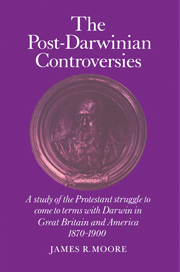 The Post-Darwinian Controversies
The Post-Darwinian Controversies Published online by Cambridge University Press: 22 January 2010
Natural selection…replaces a transcendental explanation with a natural one. To be sure, it does not explain force, and thus leaves the whole subject shrouded in as deep fundamental mysticism as ever. But science does not hope to explain force and power, and will be satisfied to account for natural phenomena by…natural forces acting in accordance with natural laws. Natural selection was a great step in this direction.
H. W. ConnEvolution has not taken place by the action of ‘Natural Selection’ alone, but…partly, perhaps mainly, through laws which may be most conveniently spoken of as special powers and tendencies existing in each organism; and partly through influences exerted on each such organism by surrounding conditions and agencies organic and inorganic, terrestrial and cosmical, among which the ‘survival of the fittest’ plays a certain but subordinate part.
St George MivartThe last of Darwin's works directly concerned with organic evolution was the Descent of Man. From the time of its publication until his death in 1882 Darwin occupied himself with long-standing researches which served to illustrate the broader significance of his theory. The first and last fruits of his labour – The Expression of the Emotions in Man and Animals (1872) and The Formation of Vegetable Mould through the Action of Worms, with Observations on Their Habits (1881) – had a psychological interest. Other volumes reported his work on plants: Insectivorous Plants (1875), The Movements and Habits of Climbing Plants (1875), The Effects of Cross and Self Fertilisation in the Vegetable Kingdom (1876), and The Different Forms of Flowers on Plants of the Same Species (1877).
To save this book to your Kindle, first ensure [email protected] is added to your Approved Personal Document E-mail List under your Personal Document Settings on the Manage Your Content and Devices page of your Amazon account. Then enter the ‘name’ part of your Kindle email address below. Find out more about saving to your Kindle.
Note you can select to save to either the @free.kindle.com or @kindle.com variations. ‘@free.kindle.com’ emails are free but can only be saved to your device when it is connected to wi-fi. ‘@kindle.com’ emails can be delivered even when you are not connected to wi-fi, but note that service fees apply.
Find out more about the Kindle Personal Document Service.
To save content items to your account, please confirm that you agree to abide by our usage policies. If this is the first time you use this feature, you will be asked to authorise Cambridge Core to connect with your account. Find out more about saving content to Dropbox.
To save content items to your account, please confirm that you agree to abide by our usage policies. If this is the first time you use this feature, you will be asked to authorise Cambridge Core to connect with your account. Find out more about saving content to Google Drive.